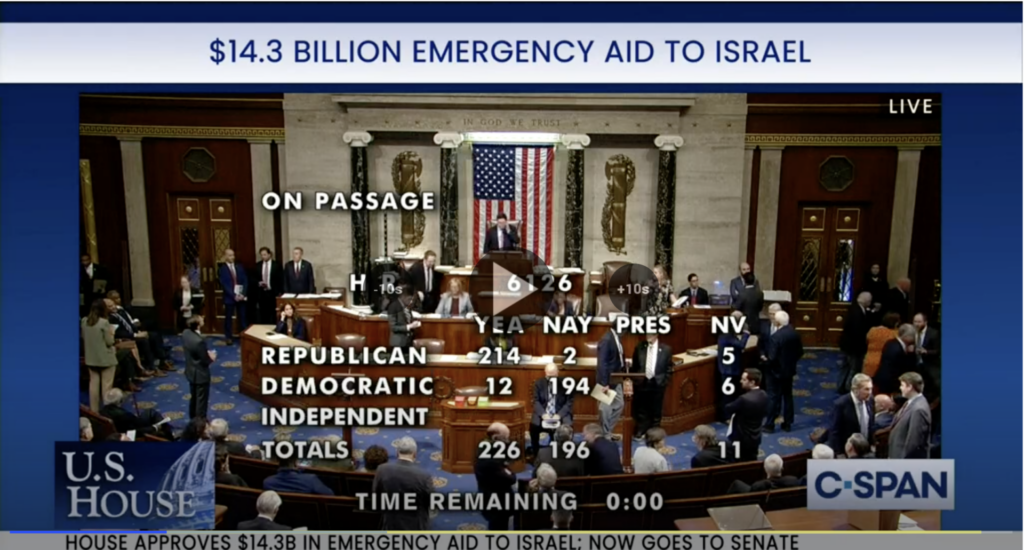Emergency aid to Israel needs scrutiny
By Victor Gilinsky | November 15, 2023
 The House passed a $14.3 billion aid package for Israel, 226-196, on November 2.
The House passed a $14.3 billion aid package for Israel, 226-196, on November 2.
Onetime White House chief of staff Rahm Emanuel famously said, “You never want a serious crisis to go to waste.” It’s an opportunity to do things that you couldn’t do before. That appears to be the guiding philosophy of the drafters of the $14 billion emergency supplemental appropriation the House passed on November 2—without any hearings. The measure has no future in the Senate because the Republicans put a stinger on the bill’s tail—a requirement that the money gets taken from the Internal Revenue Service appropriation, which ironically would increase the measure’s cost because it would reduce the IRS’s ability to prevent tax cheating.
But after the IRS provision is removed the Senate will likely approve the bulk of the bill one way or another. Although $14 billion is nearly four times the annual sum given to Israel, the press has shown little interest in describing what the bill provides. Here is what is in there.
The first item in the bill, $4.4 billion, is for the replacement of Defense Department weapon stocks and related services supplied to Israel. The department keeps weapon stocks in Israel, ostensibly for US forces, but with US approval Israel can draw on them. In addition, the bill would appropriate about $850 million to the US armed services, mainly the Army, “to respond to the attacks in [sic] Israel.”
An additional $4 billion is allotted to the secretary of defense to provide to Israel for “procurement the Iron Dome and David’s Sling defense systems to counter short-range rocket threats.” Iron Dome is an Israeli mobile air defense system developed and built by Israeli arms firms—Rafael and Israeli Aerospace Industries—to intercept short-range rockets and artillery that threaten inhabited areas. The United States has already contributed about $2.6 billion for the development and deployment of this system. David’s Sling is an air defense missile system being developed by Rafael and Raytheon to intercept planes, drones, and missiles at longer ranges. It would essentially be a replacement for Raytheon’s Patriot system.
Although the bill was portrayed as an emergency response to the October 7 Hamas attack that had to be moved quickly, it includes $1.35 billion under the heading of “Research, Development, Test and Evaluation.” Of this sum, $1.2 billion is for the secretary of defense to provide to Israel for the development of the Iron Beam system “to counter short-range rocket threats.” Rafael, the developer, describes it as a high-energy laser interceptor system, possibly effective to several kilometers, that would be part of a multi-system air defense.
The State Department is allotted $150 million for responding to the attacks in Israel, including for possible relocation support for US diplomatic personnel. Of this sum, $100 million will be available for State’s Worldwide Security Protection program for the US embassy in Jerusalem and other missions “affected by the attacks in Israel.” An additional $50 million would be for emergency evacuation of US government personnel and US citizens in countries impacted by the attacks in Israel.
In addition, $3.5 billion is given to the president to distribute in response “to the attacks in Israel.” If Israel requests and the president agrees, he may spend the entire sum on “advanced weapon systems” in Israel. Moreover, any congressional notification requirements applicable to these funds “may be waived if a determination is made that extraordinary circumstances exist that impact the national security of the United States.” In plain English, the president can keep secret, not only from the public but also from Congress, where this money went.
Adding up the appropriations—$5.25 billion to the Defense Department (almost entirely to replace arms stocks given to Israel), $4 billion to Israeli firms and Raytheon for air and missile defense systems, $1.35 billion mostly to Israel for R&D on laser interceptors, $150 million for State Department requirements, and $3.5 billion for the president to distribute, presumably to Israel—gives us the canonical $14.3 billion.
It appears that over $8 billion would go directly to Israel, to be spent in Israel. This is an unusually large fraction of “Off-Shore Procurement.” Of the $3.8 billion aid package Israel gets annually, less than a quarter qualifies for OSP, and even that was regarded as generous.
The House measure would also modify existing legislation to change rules on what weapons are eligible for export to Israel and how individual weapon prices were calculated to liberalize what Israel would get in the way of weapons for the money allotted.
There are many issues here that should be examined before rushing ahead with this weapons package. There is time to do so, because even looked at from an Israeli perspective, there is no immediate need for most of the listed items. Among the questions to address in the context of the bill are: Does Congress want to subsidize so generously the Israeli arms industry, which is in competition with American firms and so affects American jobs? Do longer range items like research and development belong in a rush emergency appropriation? Does the bill comply with US legislation prohibiting aid to units implicated in gross violations of human rights? And should the billions to be spent at the president’s direction be free of Congressional and public scrutiny—that is, hidden from the American public? The Israelis will, of course, know what they got.
The larger question is: Do we really want to provide Israel with a huge, no-strings-attached weapons package when American attempts to temper Israel’s ferocious reaction to Hamas’s attack get the back of the hand and there is no end in sight to the conflict? The Senate should hold hearings.
Together, we make the world safer.
The Bulletin elevates expert voices above the noise. But as an independent nonprofit organization, our operations depend on the support of readers like you. Help us continue to deliver quality journalism that holds leaders accountable. Your support of our work at any level is important. In return, we promise our coverage will be understandable, influential, vigilant, solution-oriented, and fair-minded. Together we can make a difference.
Keywords: $14 billion, House of Representatives, Israel, emergency aid
Topics: Opinion, Special Topics














